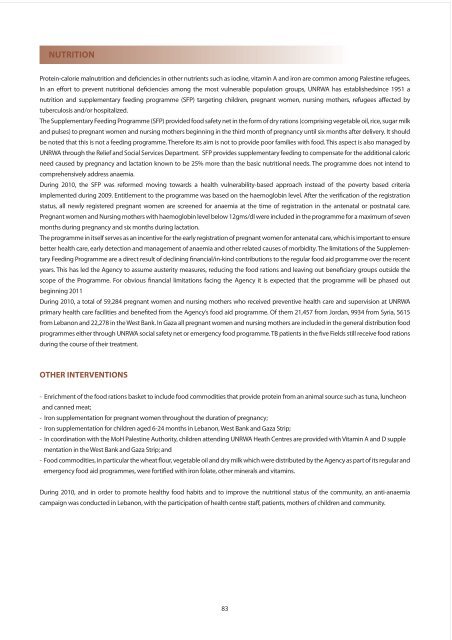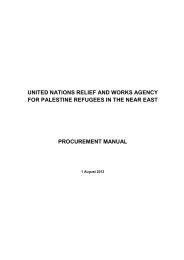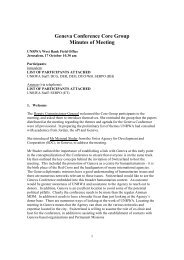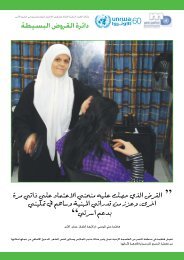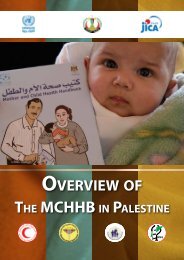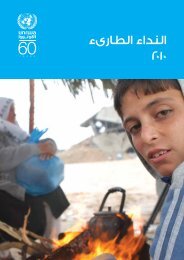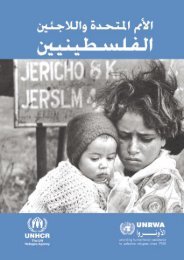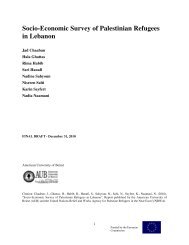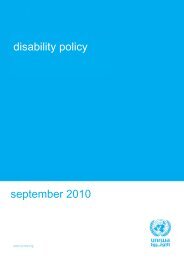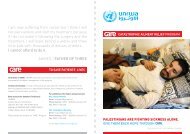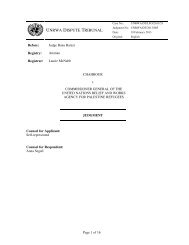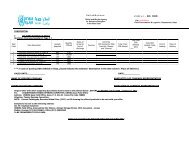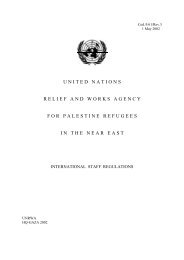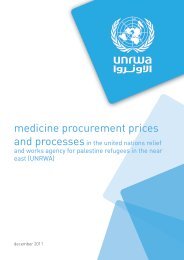Annual Report of the Department of Health 2010 - Unrwa
Annual Report of the Department of Health 2010 - Unrwa
Annual Report of the Department of Health 2010 - Unrwa
You also want an ePaper? Increase the reach of your titles
YUMPU automatically turns print PDFs into web optimized ePapers that Google loves.
NUTRITION<br />
Protein-calorie malnutrition and deficiencies in o<strong>the</strong>r nutrients such as iodine, vitamin A and iron are common among Palestine refugees.<br />
In an effort to prevent nutritional deficiencies among <strong>the</strong> most vulnerable population groups, UNRWA has establishedsince 1951 a<br />
nutrition and supplementary feeding programme (SFP) targeting children, pregnant women, nursing mo<strong>the</strong>rs, refugees affected by<br />
tuberculosis and/or hospitalized.<br />
The Supplementary Feeding Programme (SFP) provided food safety net in <strong>the</strong> form <strong>of</strong> dry rations (comprising vegetable oil, rice, sugar milk<br />
and pulses) to pregnant women and nursing mo<strong>the</strong>rs beginning in <strong>the</strong> third month <strong>of</strong> pregnancy until six months after delivery. It should<br />
be noted that this is not a feeding programme. Therefore its aim is not to provide poor families with food. This aspect is also managed by<br />
UNRWA through <strong>the</strong> Relief and Social Services <strong>Department</strong>. SFP provides supplementary feeding to compensate for <strong>the</strong> additional caloric<br />
need caused by pregnancy and lactation known to be 25% more than <strong>the</strong> basic nutritional needs. The programme does not intend to<br />
comprehensively address anaemia.<br />
During <strong>2010</strong>, <strong>the</strong> SFP was reformed moving towards a health vulnerability-based approach instead <strong>of</strong> <strong>the</strong> poverty based criteria<br />
implemented during 2009. Entitlement to <strong>the</strong> programme was based on <strong>the</strong> haemoglobin level. After <strong>the</strong> verification <strong>of</strong> <strong>the</strong> registration<br />
status, all newly registered pregnant women are screened for anaemia at <strong>the</strong> time <strong>of</strong> registration in <strong>the</strong> antenatal or postnatal care.<br />
Pregnant women and Nursing mo<strong>the</strong>rs with haemoglobin level below 12gms/dl were included in <strong>the</strong> programme for a maximum <strong>of</strong> seven<br />
months during pregnancy and six months during lactation.<br />
The programme in itself serves as an incentive for <strong>the</strong> early registration <strong>of</strong> pregnant women for antenatal care, which is important to ensure<br />
better health care, early detection and management <strong>of</strong> anaemia and o<strong>the</strong>r related causes <strong>of</strong> morbidity. The limitations <strong>of</strong> <strong>the</strong> Supplementary<br />
Feeding Programme are a direct result <strong>of</strong> declining financial/in-kind contributions to <strong>the</strong> regular food aid programme over <strong>the</strong> recent<br />
years. This has led <strong>the</strong> Agency to assume austerity measures, reducing <strong>the</strong> food rations and leaving out beneficiary groups outside <strong>the</strong><br />
scope <strong>of</strong> <strong>the</strong> Programme. For obvious financial limitations facing <strong>the</strong> Agency it is expected that <strong>the</strong> programme will be phased out<br />
beginning 2011<br />
During <strong>2010</strong>, a total <strong>of</strong> 59,284 pregnant women and nursing mo<strong>the</strong>rs who received preventive health care and supervision at UNRWA<br />
primary health care facilities and benefited from <strong>the</strong> Agency’s food aid programme. Of <strong>the</strong>m 21,457 from Jordan, 9934 from Syria, 5615<br />
from Lebanon and 22,278 in <strong>the</strong> West Bank. In Gaza all pregnant women and nursing mo<strong>the</strong>rs are included in <strong>the</strong> general distribution food<br />
programmes ei<strong>the</strong>r through UNRWA social safety net or emergency food programme. TB patients in <strong>the</strong> five Fields still receive food rations<br />
during <strong>the</strong> course <strong>of</strong> <strong>the</strong>ir treatment.<br />
OTHER INTERVENTIONS<br />
- Enrichment <strong>of</strong> <strong>the</strong> food rations basket to include food commodities that provide protein from an animal source such as tuna, luncheon<br />
and canned meat;<br />
- Iron supplementation for pregnant women throughout <strong>the</strong> duration <strong>of</strong> pregnancy;<br />
- Iron supplementation for children aged 6-24 months in Lebanon, West Bank and Gaza Strip;<br />
- In coordination with <strong>the</strong> MoH Palestine Authority, children attending UNRWA Heath Centres are provided with Vitamin A and D supple<br />
mentation in <strong>the</strong> West Bank and Gaza Strip; and<br />
- Food commodities, in particular <strong>the</strong> wheat flour, vegetable oil and dry milk which were distributed by <strong>the</strong> Agency as part <strong>of</strong> its regular and<br />
emergency food aid programmes, were fortified with iron folate, o<strong>the</strong>r minerals and vitamins.<br />
During <strong>2010</strong>, and in order to promote healthy food habits and to improve <strong>the</strong> nutritional status <strong>of</strong> <strong>the</strong> community, an anti-anaemia<br />
campaign was conducted in Lebanon, with <strong>the</strong> participation <strong>of</strong> health centre staff, patients, mo<strong>the</strong>rs <strong>of</strong> children and community.<br />
83


